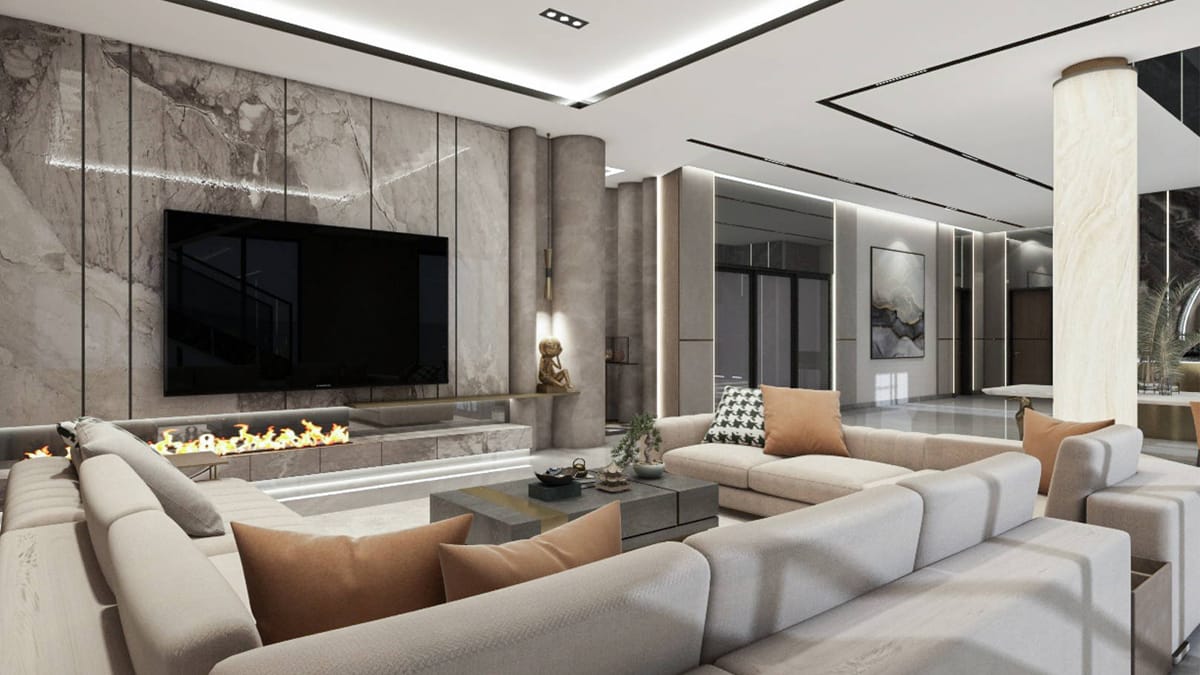
26 Oct Top Fireproof Decorative Wall Panel Options for Modern Interiors
Table of Contents
- 1 Key Takeaways
- 2 MgO Decorative Panels
- 3 Fiber Cement Panels
- 4 WPC Panels
- 5 Faux Wood Panels
- 6 Acoustic Wood Slat Panels
- 7 Fire Resistant Decorative Wall Panels Comparison
- 8 Drywall Alternatives
- 9 FAQ
- 9.1 What makes fireproof wallboard different from regular drywall?
- 9.2 Can you install decorative wallboard in wet areas like bathrooms?
- 9.3 How do you clean and maintain fireproof wallboard?
- 9.4 Are fireproof wallboard panels eco-friendly?
- 9.5 Do fireproof wallboard panels cost more than regular drywall?
When you look for fire resistant decorative wall panels, you will see many stylish choices. You can pick UV-protected decorative panels. You can also choose HPL panels made with kraft paper and resin. WPC panels use wood fibers and plastics. Many wallboard options use gypsum, cement, or mineral wool to make them safer from fire. Some wallboard types use eco-friendly materials or are waterproof. If you want eco-friendly options, look for stylish wallboard made from recycled or sustainable things. These choices give you fire protection and good design.
Key Takeaways
MgO decorative panels are very safe from fire and good for the environment. They last a long time, are simple to put up, and do not have bad chemicals.
Fiber cement boards are very strong and do not get damaged by water, mold, or bugs. They work well in wet places and keep you safe from fire.
WPC panels mix wood fibers and plastic, so they do not get ruined by water and slow down fire. They look nice in both modern and country-style rooms.
Faux wood panels look like real wood but are safer from fire. They are simple to put up and can be good for the earth, depending on what they are made of.
Acoustic wood slat panels help lower noise and keep you safe from fire. They are great for big rooms like offices and schools.
MgO Decorative Panels
Features
MgO decorative panels are a modern wallboard choice. They are eco-friendly and safe for homes or offices. These panels do not let out harmful chemicals. This helps keep the air inside healthy. You can pick from many textures and designs. It is easy to match your style. The panels are strong and do not scratch easily. They are also simple to put up.
Feature | Description |
|---|---|
Fire Resistance | Enhanced fire resistance due to high-density magnesium oxide composition. |
Healthier Indoor Atmosphere | Free from VOCs and carcinogens, promoting a healthier indoor environment. |
Design Flexibility | Offers various textures and designs for creative possibilities. |
Durability | Superior durability and scratch resistance. |
Easy Installation | Simplifies the decoration process. |
Fire Resistance
MgO wallboard gives top fire resistance. These panels meet high international standards. They include ASTM E136 and EN 13501-1, both rated Class A1. This means the panels do not burn or help fires grow. You can feel safe knowing your walls help protect your space.
Standard | Fire Resistance Rating |
|---|---|
ASTM E136 | Class A1 |
EN 13501-1 | Class A1 |
CAN/ULC S114 | Class A1 |
ULC S135 | Class A1 |
Pros & Cons
Tip: MgO wallboard has many good points. You should think about some challenges before you choose it.
Pros:
Highly resistant to water damage and mold
Strong and long-lasting
Made from eco-friendly materials
Cons:
Costs more at first than regular wallboard
May need special tools to cut
Can make dust when you install it
Uses
MgO decorative panels work in many places. They are good for walls in homes, offices, and stores. You can use them for ceilings and subflooring. They are also a base for tiles in kitchens and bathrooms. These panels fit in fire-rated doors, furniture, and acoustic panels to help with noise.
Application Type | Description |
|---|---|
Interior Walls | Durable and fire-rated walls in homes, offices, and commercial buildings. |
Ceilings | Ideal for suspended ceilings in malls, offices, theaters, and classrooms. |
Subflooring | Used as a base under tiles or wood, resistant to moisture and swelling. |
Fire-Rated Doors | Serves as a core in certified fire-rated doors, offering thermal stability. |
Furniture Panels | Provides strength for cabinetry and shelving with a paintable surface. |
Acoustic Panels | Reduces noise transmission in schools, libraries, and offices. |
Cost
MgO wallboard costs more than regular gypsum wallboard. You will pay between $16.14 and $26.91 for each square meter. Regular gypsum wallboard costs $4.30 to $12.91 per square meter. The price is higher, but you get better fire protection. You also get eco-friendly materials and longer-lasting panels.
Panel Type | Cost per Square Meter |
|---|---|
MgO Boards | |
Regular Gypsum Boards | $4.30 – $12.91 |
Fiber Cement Panels
 Features
Features
Fiber cement boards are strong and good for the planet. They are made from cement, sand, and cellulose fibers. You can pick from many colors and textures. These panels do not get damaged by water, mold, or bugs. They do not bend or rot. You can use them in wet places. Many people like them because they last long and are eco-friendly.
Made with cement, sand, and cellulose fibers
Eco-friendly and can be recycled
Come in many colors and finishes
Do not get ruined by water, mold, or bugs
Good for places with lots of moisture
Fire Resistance
Fiber cement boards are great at stopping fire. You can trust them to keep your space safe. They have a flame spread index of 0. Their smoke-developed index is only 5. This means they do not help fire grow and make little smoke. They meet tough rules like NFPA 285 and CAN/ULC S134. In real fires, like the Mendocino Lake Complex fire, buildings with these boards stayed safe when others did not.
Metric | Value |
|---|---|
Flame Spread Index (FSI) | Very low |
Smoke Development Index (SDI) | Very low |
Fire Resistance Classification | Class A |
Heat Release | Very little |
Non-Combustibility Compliance | Yes |
Fire Propagation Compliance | Yes |
Rating | Class A1 or A2 |
Pros & Cons
Note: Fiber cement boards have many good sides, but there are some things to think about.
Pros | Cons |
|---|---|
Very strong and last long | Cost more at first |
Look nice in many ways | Harder to install |
Easy to take care of | Need to repaint sometimes |
Save energy |
|
Good for the environment |
|
Uses
You can use fiber cement boards in lots of places. Schools use them because they are cheap and easy to clean. Hospitals like them because they are tough and look neat. Offices and stores use them for their style and strength. You can also find them in theaters, concert halls, and meeting centers. These panels look good and last a long time.
Schools
Hospitals
Office buildings
Theaters and concert halls
Meeting centers and pavilions
Stores
Cost
Fiber cement boards cost $6 to $12 for each square foot. They cost more at first than regular wallboard. But you get better fire safety and they last longer. Skilled workers should put them in for best results. Compared to other wallboards, they are a good deal for the price. You also get eco-friendly panels that last for years.
Material Type | Cost per Square Foot | Characteristics |
|---|---|---|
Fiber Cement Panels | $6 – $12 | Strong, not too costly, need skilled workers |
MgO Panels | $16.14 – $26.91 | Eco-friendly, very fire resistant |
WPC Panels | $5 – $25 | Strong, affordable, tough |
WPC Panels
Features
WPC panels are a modern wallboard choice. They mix wood fibers and plastic together. This makes them strong and helps them last a long time. These panels do not soak up water easily. You can use them in wet places where other wallboards might get ruined. WPC panels also meet fire-retardant rules, so they help keep you safe. Many people like them because they use recycled materials and are good for the planet.
Fire resistant
Treated to stop water from soaking in
Meet fire-retardant rules
Good for wet places and places needing safety
Fire Resistance
You want your wallboard to help keep you safe. WPC panels pass tough fire safety tests. They have certifications like ASTM E84 and EN13501 (Bf1-S1). These show they slow down fire. Top brands have reports from SGS, TUV, INTERTEK, and SETSCO. These panels also have CE and ISO14025 certifications. This means they meet world safety and eco-friendly rules.
Certification | Description |
|---|---|
ASTM E84 | Top Level |
EN13501 | Bf1-S1 |
SGS | Inspection report |
TUV | Inspection report |
INTERTEK | Inspection report |
SETSCO | Inspection report |
CE | Certification |
ISO14025 | Certification |
Pros & Cons
Tip: WPC panels have many good points, but there are some things to think about before you choose.
Aspect | Benefits | Drawbacks |
|---|---|---|
Fire Safety | Treated to be fire-resistant, so they help keep you safe. | Cost more at first than regular wood. |
Aesthetics | Look like real wood and come in many colors. | Some stains are hard to clean off. |
Uses
You can use WPC wallboard in many styles. They look good in living rooms and modern homes. They also fit rustic, industrial, and coastal styles. You can use them for feature walls, accent spots, or even ceilings.
Living rooms
Modern homes
Rustic style
Industrial style
Contemporary look
Coastal or nautical style
Cost
WPC wallboard comes in different prices. Standard panels cost $8 to $12 per square meter. Fire-resistant panels cost $10 to $15 per square meter. High-density panels can cost up to $18 per square meter. You pay more for extra fire safety and eco-friendly features. But you get panels that last longer and look nice.
Product Type | Price Range (USD/m²) |
|---|---|
Standard WPC Wall Panel | $8 – $12 |
Fire-Resistant WPC Panel | $10 – $15 |
High-Density WPC Panel | $12 – $18 |
Faux Wood Panels
 Features
Features
Faux wood panels look like real wood but are safer. They use strong materials that last a long time. Many panels do not get damaged by water. This means they work well in kitchens and bathrooms. Some panels have fire-retardant treatments or special cores. These make them safer for homes and offices. You can find eco-friendly panels too. Some are made from recycled or responsibly sourced materials.
Engineered fire ratings keep flames and smoke low
Moisture resistance helps panels last longer
Fire-retardant treatments or cores add safety
Eco-friendly choices are available
Fire Resistance
Faux wood panels are safer than real wood in a fire. Makers add flame retardants to the wallboard. This slows down fire and makes less smoke. In tests, these panels get ratings like Bf1-s1 or Bf1-t0. These ratings mean the panels do not burn fast and make little smoke. Real wood can catch fire quickly if not treated. Treating real wood can hurt eco-friendly goals.
WPC panels have flame retardants for better fire safety
Tests show low flame spread and smoke
Real wood burns more easily unless treated
Pros & Cons
Tip: Think about the good and bad sides before picking faux wood wallboard.
Cons of Faux Wood Panels | |
|---|---|
Makes rooms feel warm and natural. | Can get damaged by water or heat. |
Easy to install, like peel-and-stick panels. | Needs care to stay looking nice. |
Some options are good for the environment. | Not as tough as real wood in some places. |
Uses
You can use faux wood wallboard in many places. Fire-rated faux wood beams are good for mantels and ceilings. PET felt panels can look like many wood types. These are great for offices, libraries, and meeting rooms. These panels help you follow fire safety rules and look stylish.
Fireplace mantels and feature walls
Ceilings with faux wood beams
Offices, libraries, and meeting rooms
Commercial spaces needing style and safety
Cost
Faux wood wallboard usually costs less than real wood. Prices go from $8 to $20 per square foot. The price depends on the material and fire rating. Eco-friendly panels may cost a bit more. You get better safety and help the planet. You also save money because many panels are easy to install.
Acoustic Wood Slat Panels
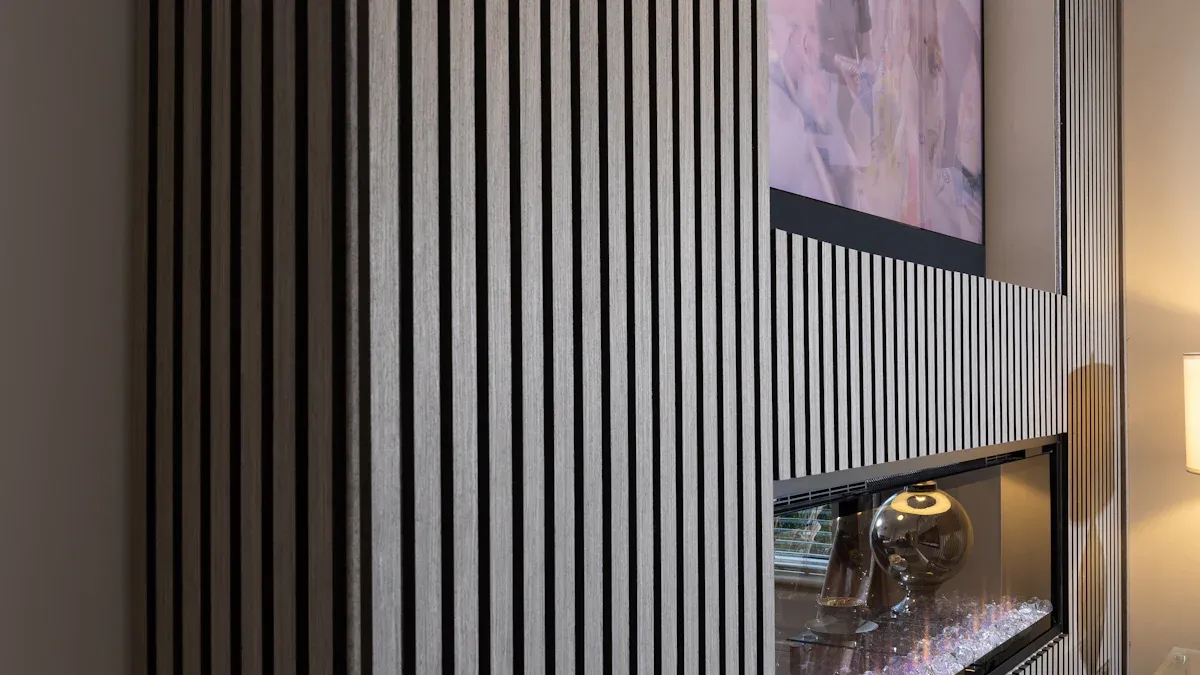
Features
Acoustic wood slat panels help control sound and look nice. They use MDF and polyester fiber. These materials help absorb noise and keep rooms quiet. The panels do not bend or change shape with heat or cold. You can clean them with a vacuum or duster. Many people like these panels because they are good for the planet and last long.
Feature | Description |
|---|---|
Sound Absorption Performance | NRC is between 0.85 and 0.94, so sound is controlled well. |
Material Composition | MDF and polyester fiber make the panels strong and eco-friendly. |
Fire-retardant Test | Panels pass fire tests for extra safety. |
Physical Stability | Panels stay the same in hot or cold places. |
Maintenance | Easy cleaning keeps panels looking new. |
Fire Resistance
These panels help keep your space safe from fire. They pass the ASTM E84 test with a B1 fire rating. This means flames move slowly on the panels. You can trust them in places where safety is important.
Fire Rating | Standard |
|---|---|
B1 | ASTM E84 |
Pros & Cons
Acoustic wood slat panels make rooms feel warm and cozy. They have natural wood patterns that look special. The panels help stop echoes and lower noise.
Advantages | Disadvantages |
|---|---|
Can get damaged by water | |
Absorbs sound | Needs to be cleaned often |
Reduces sound bouncing | Heavy panels need strong support |
You can make your room look unique.
The panels help stop sound from bouncing around.
Remember, real wood can get hurt by water.
Heavy panels should be put up by experts.
Uses
You can use these panels in many modern places. They work well in big rooms, lobbies, and schools. You will see them in offices and public spaces where sound and fire safety are important.
Atriums
Lobbies
Learning environments
Cost
These panels cost $10 to $19 for each square foot. They cost more than some other wallboards. But you get eco-friendly materials and great sound control. The price shows the good quality and safety you get.
Fire Resistant Decorative Wall Panels Comparison
When you pick fire resistant decorative wall panels, you want to see how they compare. You should check fire safety, looks, if they are good for the planet, and price. The table below helps you compare the main choices fast.
Panel Type | Fire Resistance | Aesthetics & Design Options | Sustainability & Eco-Friendly | Cost (per m²) |
|---|---|---|---|---|
MgO Boards | Non-combustible, meets top standards (ASTM E136, EN 13501-1) | Many textures and colors | Low CO₂, non-toxic, VOC-free | $10–$14 |
Fiber Cement Boards | Non-combustible, needs coatings for best results | Many finishes, modern look | Higher carbon footprint | $9–$12 |
WPC Panels | Fire-retardant, passes ASTM E84, EN13501 | Looks like wood, many colors | Uses recycled materials | $8–$18 |
Faux Wood Panels | Fire-retardant, slows flames and smoke | Real wood look, warm feel | Some use recycled content | $8–$20 (per sq ft) |
Acoustic Wood Slat | B1 fire rating, slows flame spread | Modern, stylish, controls sound | Often made with recycled fiber | $10–$19 (per sq ft) |
Tip: MgO boards give the best fire safety and are very eco-friendly. Fiber cement wallboard also stops fire well, but making it uses more energy. WPC panels are safe from fire, look nice, and use recycled stuff. Faux wood panels look warm and real, but check if they are eco-friendly. Acoustic wood slat panels help with sound and fire safety, and many use recycled fiber.
You should think about how much work each panel needs. MgO wallboard is easy to care for because it fights water, mold, and fire. Fiber cement wallboard can crack or need new paint after a while. WPC panels last a long time and do not need much care. Faux wood and acoustic wood slat panels may need more cleaning, but they look great.
If you want the safest and most eco-friendly panel, pick MgO boards. For a good mix of price, style, and fire safety, WPC panels are a smart choice. If you like a warm look, faux wood panels are a good option. Acoustic wood slat panels are best if you want to control sound and keep your space safe.
Drywall Alternatives
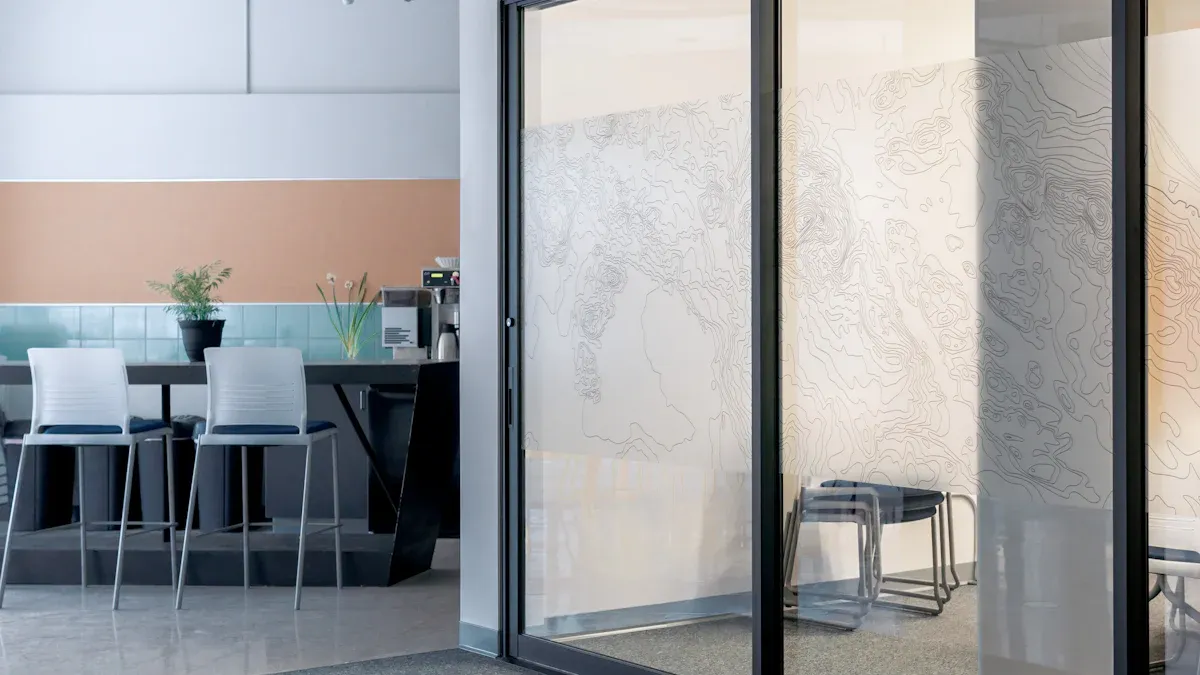
If you want something different from drywall, you have many choices. These wallboard alternatives use special materials to keep your home safe. They are stronger and bend more than regular drywall. You can make your home look modern and stay safe at the same time.
You might wonder how these wallboard alternatives are different from drywall. The table below shows how they compare:
Aspect | Fireproof Decorative Wall Panels | Traditional Drywall |
|---|---|---|
Fire Safety | Made to meet fire rules with better materials | Fire-resistant, but needs to be put in right |
Design Flexibility | Many styles and colors, still safe | Usually plain, but can add decorations |
Installation Cost | Might cost more for extra fire safety | Cheaper, but may need two layers for safety |
Wallboard alternatives give you more ways to decorate your space. You can pick colors, patterns, and textures you like. You do not have to have boring walls. Many wallboard alternatives are also good for the planet. You can help the earth and make your home look nice.
These wallboard alternatives are also easier to take care of. The next table shows how they save you time and money:
Aspect | Fireproof Decorative Wall Panels | Traditional Drywall |
|---|---|---|
Fire Resistance | Keeps a strong barrier | Might need more layers |
Maintenance Complexity | Easier to clean and keep up | Harder if you want fire safety |
Cost Implications | Can be cheaper with upgrades | Costs more with two layers |
You do not have to paint or fix cracks as much with these panels. Many wallboard alternatives do not get ruined by water, mold, or stains. Your home stays cleaner and safer. If you want something strong, stylish, and good for the earth, try drywall alternatives. They are better than fire rated drywall in many ways.
Tip: Picking wallboard alternatives gives you more than fire safety. You get easy cleaning, cool designs, and eco-friendly choices. Try these instead of fire rated drywall for a better home.
You have many choices when picking fire resistant decorative wall panels. Each wallboard type offers unique strengths. MgO panels give you top fire safety and eco-friendly benefits. Fiber cement wallboard lasts long and works well in wet places. WPC panels look like wood and use recycled materials. Faux wood panels add warmth and style. Acoustic wood slat wallboard controls sound and keeps rooms safe. Think about your space, budget, and style. Always check fire ratings before you decide.
For special projects, talk to a wallboard expert or do more research to find the best fit.
FAQ
What makes fireproof wallboard different from regular drywall?
Fireproof wallboard uses special materials that stop fire from spreading. You get better safety for your home or office. Regular drywall does not protect as well during a fire.
Can you install decorative wallboard in wet areas like bathrooms?
You can use many types of wallboard in bathrooms. Some panels resist water and mold. Always check the product label before you install it in wet spaces.
How do you clean and maintain fireproof wallboard?
Use a soft cloth or vacuum to clean your wallboard. Most panels do not need paint or special cleaners. You keep your walls looking new with simple care.
Are fireproof wallboard panels eco-friendly?
Many fireproof wallboard panels use recycled or natural materials. You help the planet when you choose these options. Look for eco labels on the packaging.
Do fireproof wallboard panels cost more than regular drywall?
You pay more for fireproof wallboard at first. The panels last longer and need less repair. Over time, you save money because your walls stay strong.

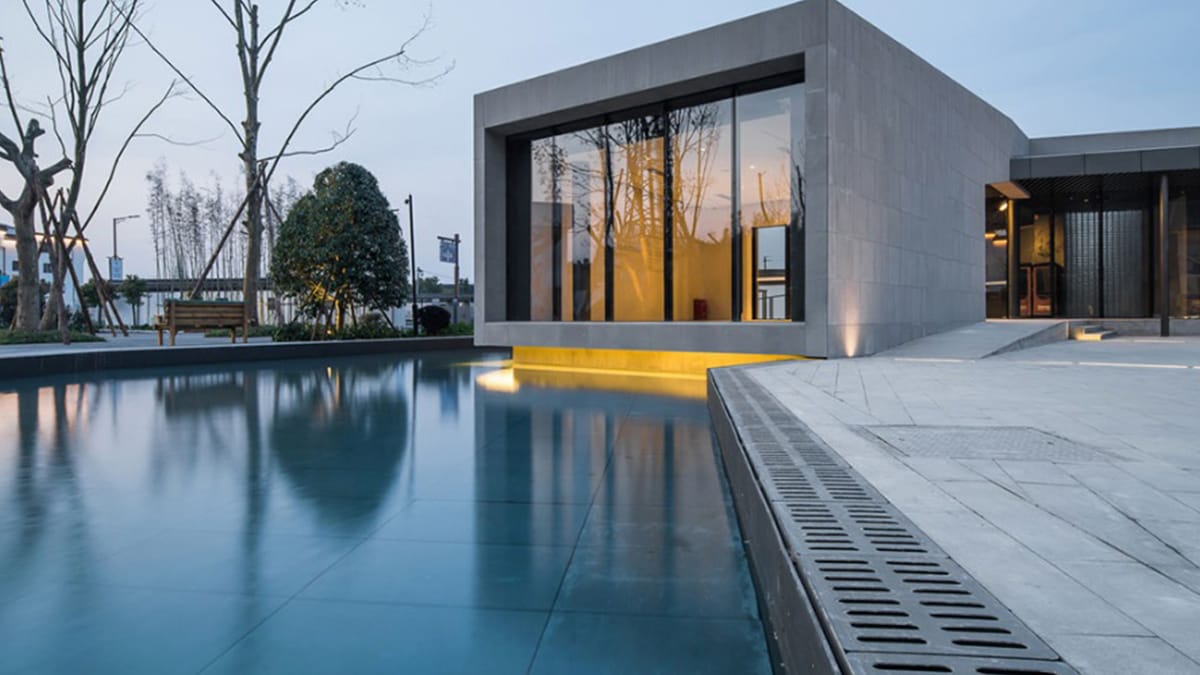 Features
Features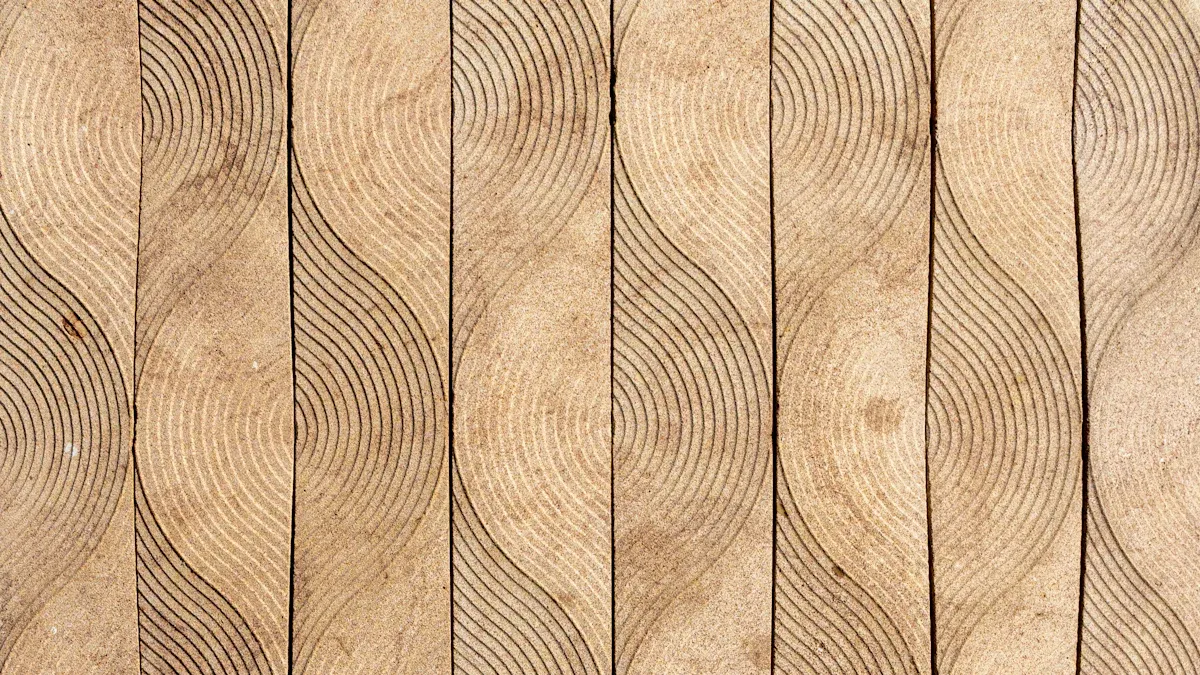 Features
Features